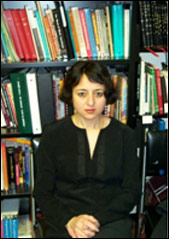نعم،
بابيونة القائد التي تشبه سهماً يشير إلى جهتين مختلفتين
كانت مرهقة،
ولم نر أصابع العازفين
غير أننا تابعنا خروجهم واحداً واحداً
وعرفنا أن الشعراء الذين جاءوا مبكراً
قد تحيزوا للناي
رغم أن حزنه سليم وكامل
وأنهم دخنوا كثيراً بين كل مقطوعتين
كل ذلك لم يهمنا ؛
فقد كنا نريد أن نرى الستارة السوداء في خلفية المسرح.
تأخرنا
وبالكاد، استطعنا أن نلمح الأكاديميين
وهم يستردون معاطفهم.
لا، في الواقع كان الجو مكتوماً
كأنك في ثكنة عسكرية، مضطر لترديد النشيد الوطني
غير أنها – كما تعلم – تُمطر عادةً في الأفلام الأجنبية.
لم نحزن لانتهاء الحفل
وبدلاً من أن نمد حبل الدراما إلى البر المقابل
عبرنا الكوبري
وألقينا التحية على بائع الطراطير
العائد لتوه من مولد الحسين.
نعم،
تهت عنهم وسط موكب من الجِمال
يخرج من الجامعة العربية
وعندما تجمعنا ثانية
أعطينا الجندي الواقف أمام بناية
لا يعرف اسمها، بعض سجائرنا
ووصلنا أخيراً إلى بار وسط المدينة
برحابةٍ انسانيةٍ وخدوشٍ متفرقة.
كان علينا أن نجلس هناك أربع سنوات
فقرأنا سمير أمين
وحاولنا تمصير هنري ميلر
أما كونديرا، فقد غيّر تبريراتنا للخيانة.
واستلمنا هناك،
رسالة من صديقٍ يعيش في باريس
يخبرنا أنه اكتشف داخله
شخصاً آخر لم يتعود عليه
وأنه- يومياً – يجر تعاسته خلفه
على أرصفةٍ أكثر نعومةًً من أرصفة العالم الثالث،
ويتحطم بشكلٍ أفضل
فحقدنا عليه عدة شهور
وتمنينا أن يطردونا إلى مدينة أخرى.
لم نرتبك عندما نفدت نقودنا
وبعد دعاءٍ قصيرٍ
انفجر تحت أقدامنا – والله – بئرٌ من البيرة
فمثلنا دور من فقدوا الوعي
وصنفنا قاموساً يخصنا . . من قبيل:
رِوِشْ:
هنيني:
عَوَق:
دناشين: … إلخ
وعندما اقترح أكبرنا سناً أن نصبح إيجابيين
كنتُ أفكر في طريقةٍ
لتحويل الحمّامات العمومية للبكاء
والميادين الكبيرة للتبوّل
لحظتها،
صرخ مثقفٌ مخضرمٌ في صديقه:
(عندما أتحدث عن الديمقراطية، تخرس خالص)
فجرينا ساعةً
وأصبحنا أكثر هدوءاً في شارع المُعزّ
حيث قابلنا شهيداً منزعجاً
وطمأنّاه أنه حيّ . .
ويُمكن أن يسترزق إذا أراد
ثم إنه لم تكن هناك معركةٌ أصلاً.
نعم،
كنا على وشك توطيد علاقتنا بالميتافيزيقا
لولا أن أحدنا كان يداري جمجمته
تحت قبعةٍ فاخرةٍ
فبدونا لهم على هيئة سائحين
حتى أن بائع التوابل سار خلفنا
وهو يردد: والنبي
stop
والنبي
wait
لم يبقَ أمامنا غير مقابر"الإمام"
جلسنا فيها سنةً أخرى
نشم رائحة الجوافة
وعندما قررتُ أن أتركهم جميعاً
أن أمشي وحدي
كنت قد بلغت الثلاثين.
إيمان مرسال*
من " المشي أطول وقت ممكن"، القاهرة، دار شرقيات 1997
من " المشي أطول وقت ممكن"، القاهرة، دار شرقيات 1997

 Oui, le nœud papillon du chef – comme une flèche pointant dans deux directions opposées – était bien fatigué, et on n’a pas vu les doigts des musiciens. Mais on les a vus sortir, l’un après l’autre, et on a su que les poètes qui étaient arrivés tôt avaient pris le parti de la flûte – pourtant sa tristesse est belle et pleine – et qu’ils avaient beaucoup fumé entre deux morceaux. Tout cela ne nous importait pas, nous voulions voir le rideau noir derrière la scène. On était en retard, on a juste aperçu les universitaires quand ils ont récupéré leurs manteaux.
Oui, le nœud papillon du chef – comme une flèche pointant dans deux directions opposées – était bien fatigué, et on n’a pas vu les doigts des musiciens. Mais on les a vus sortir, l’un après l’autre, et on a su que les poètes qui étaient arrivés tôt avaient pris le parti de la flûte – pourtant sa tristesse est belle et pleine – et qu’ils avaient beaucoup fumé entre deux morceaux. Tout cela ne nous importait pas, nous voulions voir le rideau noir derrière la scène. On était en retard, on a juste aperçu les universitaires quand ils ont récupéré leurs manteaux.